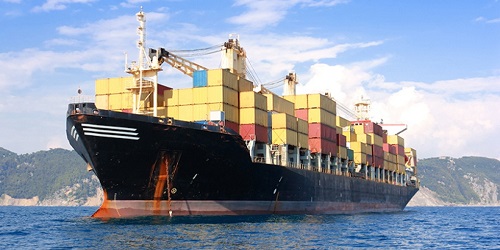
5 September 2018
The threats and opportunities of autonomous ships
As autonomous cars feature increasingly in the headlines, it seems the world of shipping is not far behind. Currently, Norway seems to be leading the way with collaboration between international technology group Kongsberg and chemical company Yara, in order to build a fully autonomous, electric container ship. The Yara Birkeland, due to be launched in 2019, is touted as a zero-emissions vessel, with the potential to reduce diesel-powered truck haulage by 40,000 journeys per year.
The transport volume of global seaborne trade has steadily risen over the last decade and today, approximately 90% of world trade is transported by vessels. As autonomous cars feature increasingly in the headlines, it seems the world of shipping is not far behind. Currently, Norway seems to be leading the way with collaboration between international technology group Kongsberg and chemical company Yara, in order to build a fully autonomous, electric container ship. The Yara Birkeland, due to be launched in 2019, is touted as a zero-emissions vessel, with the potential to reduce diesel-powered truck haulage by 40,000 journeys per year. The transport volume of global seaborne trade has steadily risen over the last decade and today, approximately 90% of world trade is transported by vessels. With a planned cargo carrying capacity of 120 TEU (Twenty-foot Equivalent Units), the Yara Birkeland will transport fertiliser via inland waterways to the Norwegian ports of Larvik and Brevik. The process of loading and unloading will also be automated and the vessel will be equipped with sensors, electric drive and propulsion control systems. Also, reportedly in development by Dutch manufacturer Port-Liner, are the first fully electric container barges. These are due to operate from ports in Antwerp, Amsterdam and Rotterdam, transporting goods around the inland waterways of Belgium and the Netherlands. Whilst designed to operate without the need for a crew, the vessels will initially be manned whilst the required infrastructure is put in place. The barges will run on 20-foot carbon neutral batteries which can be charged onshore. Similarly, to the Yara Birkeland, an overriding objective is to decrease the amount of freight transported by road, thereby reducing polluting emissions and relieving highways of heavy traffic. Other potential advantages for the shipping industry include lower operating costs and higher revenue, since removing the need for on-board accommodation will allow for increased cargo space. Despite the purported eco-friendly credentials associated with autonomous shipping, some people are sceptical with regard to their practicality. According to a survey of 1,000 maritime professionals carried out by trade union Nautilus International, 85% of respondents considered unmanned remotely controlled ships to pose a threat to safety at sea. These concerns referenced potential issues for dealing with equipment failures and security measures in the absence of a human crew. Some also expressed uneasiness about related potential job losses. Find out about Freight Forwarders Insurance here Cyber hacking emerged as a perceived threat and perhaps with valid reason. In 2017, global transport firm Maersk fell victim to the Petya cyber-attack, resulting in the temporary shutdown of some of its port terminals and widespread outage to its systems. Operations at terminals in four countries were impacted and the resulting delays lasted weeks. The attack reportedly cost the company between $250m and $300m. Hackers are targeting the shipping industry for a variety of reasons. There have been reports of hackers remotely tampering with navigation systems and altering the course of a ship, either to commandeer the vessel or seize the cargo. Criminals may also benefit from accessing sensitive data from connected devices on board. With the maritime industry rapidly digitising, some fear that the marine cargo industry will become increasingly vulnerable to these types of attacks. This has seen the emergence of companies such as CyberKeel, a firm which offers cyber-security services, such as penetration testing, to the maritime industry. The rise of automation was the key focus of the Maritime Safety Committee’s conference in May 2018. The International Maritime Organisation (IMO) pledged to examine existing safety regulation and amend international conventions to accommodate the introduction of unmanned vessels. Also impacted will be marine insurers who recognise the need to modify existing cover for maritime liability. With 75% of marine liability losses arising from human error, autonomous shipping could see this percentage dramatically reduce. However, whilst there may be a reduced risk of accident through human fault, some predict this will be counterbalanced by an increased risk resulting from lack of human intervention in case of emergency. Other implications for insurers could include potentially more complex claims, where collisions occur between manned and unmanned vessels. There may also be challenges related to product liability insurance; for example, establishing whether a shipowner is liable for an incident arising from a technical failure on his autonomous ship. Nautilus recommends the need for balancing automation with human operation, using it to enhance rather than replace human activity. However, with Japan’s NYK line also declaring an intention to trial unmanned container ships by 2019 it seems the race really is on to launch the world’s first fully autonomous ship. With many questions regarding safety, regulation and insurance needs remaining unanswered, it may not be such smooth sailing. Source: Allianz Insurance plc For information on Freight Forwarders Insurance please visit our Transportation Sector. Ascend Broking 01245 449060Recent Posts
Ascend Broking
How AI is Revolutionising Fleet Safety
Ascend Broking
The Risks of Leaving Tools in Vehicles Overnight
Ascend Broking





